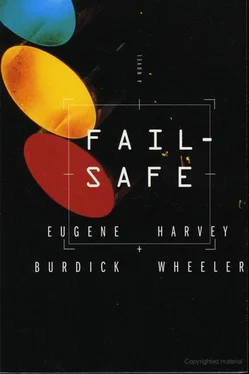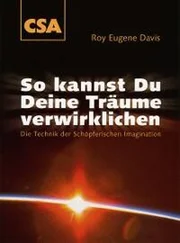“They’re at 18,000, now 19,000, now 20,000,” the operator sang out. This highly unorthodox procedure seemed to fill him with delight.
Then they both fell silent and stared at the scope. The wave of missiles was now directly overhead and Grady’s hand, without thought and quite by reflex, went to the lever which controlled the lob device, if the rockets exploded in the next second, he would have
time to lob the two bombs toward Moscow-just before the Vindicator was beaten to earth by the blast.
The line of missiles came to 20,000 feet and then passed 20,000. Then the perfect line began to angle off as the outer missiles turned toward the Bloodhounds.
Instantly Grady recognized that the tactic had succeeded. ,The missiles were now chasing the two Bloodhounds and those that were the farthest away were losing some altitude as they angled toward the two decoys. The operator was whispering to himself as he watched the instruments. He reached for control, pulled it down for a moment, and the two Bloodhounds leapt up ahead. They were still responding to signal.
The Soviet missiles also automatically boosted their speed. At one end of the line there was suddenly a bright eruption of light. One of the missiles had misfired: The blast wave was picked up by the scope and it temporarily obscured several dozens of the blips around it.
Grady shook his head and yelled into the intercom.
“Pull her back! Go for altitude!” He had also pushed the button for TBS so that Turkey 2 would hear him. “Stand by for a ram.” Four seconds later the blast wave hit the Vindicator. It seemed as if the air had suddenly turned hard. The plane was pressed down as if by a giant’s steady smashing power. Grady looked at the altimeter. In the four seconds they had gained 1,200 feet of altitude and now they had been battered back down 1,000 feet. Then the blast passed. The plane shot upward, shuddering as tiny rolling waves hit it.
The operator turned and looked at Grady. He winked. His eyes were alight with success and a hard pride. Also, there was something else in the eyes, a kind of dread knowledge. He knew that the three of them would soon be bombarded by a lethal dosage of neutrons. They would die, but not before their mission was accomplished.
The scope cleared. The Bloodhounds were now at 100,000 feet and the converging pack of Soviet missiles had taken the form of a vast arrow of pursuit. A few seconds later the Bloodhounds would reach 150,000 feet.
The defense operator chuckled to himself. “They’re getting more range than I thought,” he said. “Maybe they’ll go 200,000 feet.”
In fact, they went to 220,000 feet. Then abruptly they began to slow down and the great pursuing arrow of missiles streaked toward them. Suddenly the entire scope seemed to erupt in an enormous explosion as all the Soviet rocket warheads went off simultaneously.
Without orders the navigator had fought for altitude ever since the first blast wave had passed. They were now flying at close to 10,000 feet. When the shock wave from the explosion came it was much less severe than the first one. The awful physics of time and distance had weakened its thrust. The Vindicator was shaken savagely and the wings dipped. But when the pressure passed, although an ominous groan came from where the wings joined the fuselage, they held.
“We’re making like a fat-assed bird,” Grady shouted. Through their masks the navigator and defense operator eyed him cautiously.
“How many minutes to Moscow?” Grady asked.
“Seven minutes,” the navigator replied.
There remained only one decision for Grady to make. At the present altitude, their chances of being shot down by orthodox antiaircraft were negligible. But when they dropped the bombs, even if they made an abrupt rise of 1,000 or 1,500 feet they would be destroyed by the blast. If they climbed to 25,000 or 80,000 feet, a safe altitude, they would simplify the problem for conventional antiaircraft and increase the chances of their being shot down. But in a real sense the decision had been made. Grady felt a kind of mild euphoria. His mind raced back to the old informal days of flying where pilot and crew knew, and sometimes even loved, one another. There was no reason under current procedures why he had to talk to the other two men in the plane at all. If he wanted, he could carry out the mission completely by himself. They would, he knew, not even look at him as he gave the order to drop the bombs. But every man should have tome say in the matter of how he is to die. Anyway Grady wanted to talk.
“Look,” Grady said. “We’re not just walking wounded, we’re walking dead men. That first blast must have given us enough Roentgens to shrivel the marrow in our bones. We’d have a couple of days at best. So I intend to take her in at 900 feet and then when we are over the target to climb to 5,000. The bombs are set to detonate at 5,000 so we’ll go with them.”
He glanced at the two men. The two pairs of eyes stared levelly at him. Then Thompson spoke.
“O.K., skipper,” he said. “There’s nothing to go home to anyway.” He laughed.
The American Ambassador and the Soviet delegate to the United Nations reported on the conference line before Khrushchev came on.
“Where are you, Mr. Ambassador?” the President asked.
“On the top floor of the American Embassy in Moscow in my library,” the American Ambassador said.
“Where are you, Mr. Lentov?” the President asked the Soviet delegate.
“In the UN building in New York,” Lentov replied. “Whatever happens I would like both of you to stay precisely where you are until I release you or Premier
Khrushchev releases you,” the President said. Then, slowly and calmly, he told them what had happened. When he had finished both of the men were silent for a moment. Buck glanced at the President. He knew what all of the men on the line were thinking:
the American Ambassador was exposed, without protection if the Vindicators got through. All of the men on the line except Buck were experienced diplomats. They had run risks before. They were calm.
Buck could hardly believe what he heard next. The Soviet delegate began to discuss baseball scores. He was surprisingly knowledgeable. He confessed that his favorite team was the New York Yankees.
“I know that it is somewhat like rooting for the aristocracy,” he said with a laugh. “But I cannot resist them. The first year I was here was the year that Mantle and Maris tried to beat Babe Ruth’s homerun record. It is a question of the power and the grace. I admire both qualities.”
“In that case if you had been an American you would have become a Wall Street lawyer,” the President said.
“Oh, now, Mr. President,” the Soviet delegate answered, “remember I said power and grace. Your Wall Street people have the power, but they are still lacking in grace. No, if I had been an American, I would have been a designer, probably of cars. The only thing in America which equals our Communist party in naked power, grace, and the ability to take adversity is the American car. Its exterior is often hideous, as is our Communist party, but inside it is rugged and durable.”
“I agree with you, Ambassador Lentov, about power and grace.” It was the American Ambassador speaking.
A voice from the grave, Buck thought, casual remarks from a man about to be burned alive. A clear and steady voice, not a tremor in it. Buck’s hand began to shake violently as it denched the phone. He could not bring himself to look into the President’s face. The voice went on. “It is a combination of power and grace which makes for top success in baseball as in politics. In both games the very best are a class apart. You can tell them from the first day in a training camp. Their objective is beautifully simple. It is the top. Once they have made the decision, their energies, their intelligence, their muscles, everything, give their naked power the additional virtue of grace. The multitude of the second-best often have as much power drive, but they lack the thing that Mr. Lentov calls grace.”
Читать дальше











